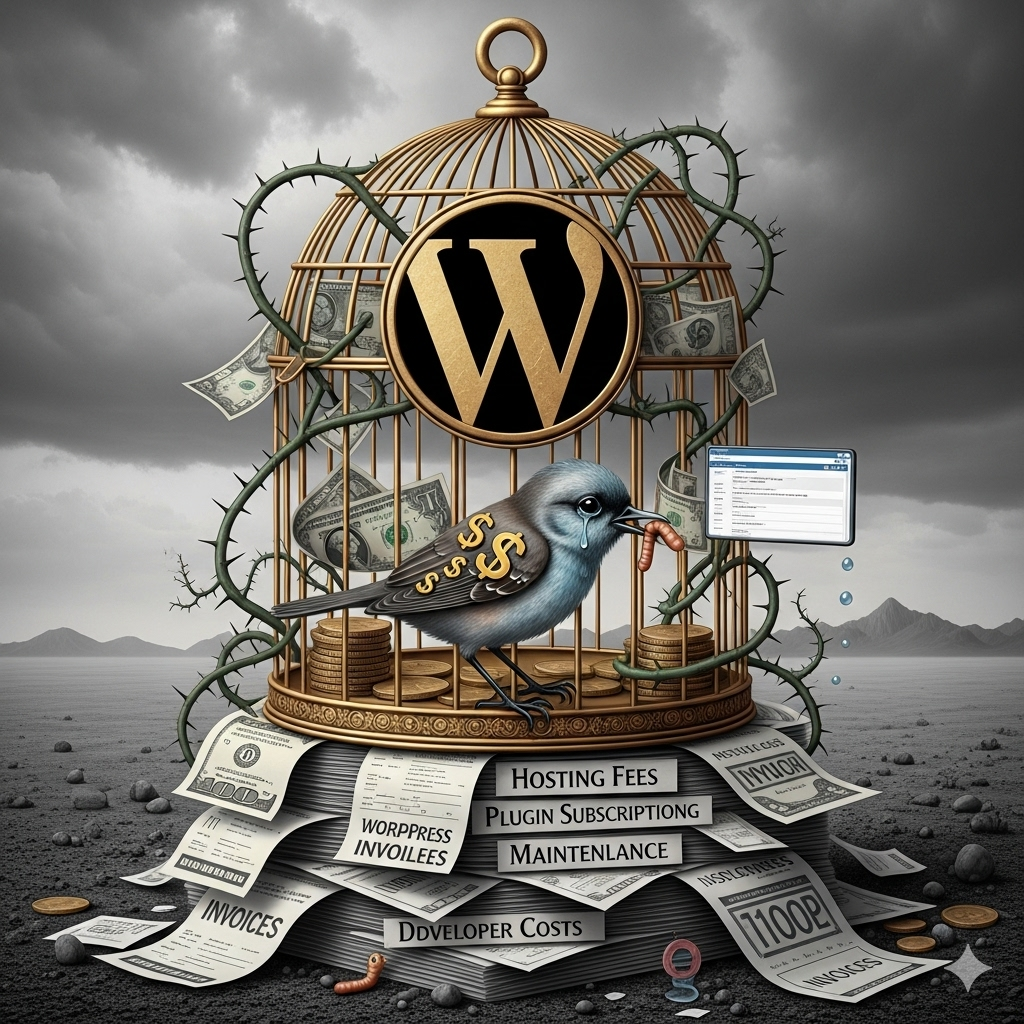FEATURED ARTICLE
Why Businesses Are Leaving WordPress Behind
Explore the limitations driving businesses to migrate from WordPress to modern, serverless solutions. Discover why smart companies are making the switch and saving 50-80% on hosting costs.
WordPress powers over 40% of websites globally, but an increasing number of businesses are discovering that what once seemed like the perfect solution has become a costly, limiting factor in their growth. Here's why smart companies are making the switch to modern web architecture.
The WordPress Cost Trap
What starts as an affordable website solution quickly becomes an expensive maintenance burden. Many businesses find themselves paying R3,600-9,000+ monthly for WordPress hosting that still doesn't deliver the performance they need. When you factor in security plugins, backup services, performance optimization tools, and developer maintenance, the true cost of WordPress becomes staggering.

Hidden WordPress Costs
Premium hosting (R3,600-9,000/month) + Security plugins (R900-1,800/month) + Backup services (R360-900/month) + Performance tools (R540-1,440/month) + Developer maintenance (R9,000-36,000/month) = R14,400-49,140/month total cost
Key Limitations Driving Migration
Escalating Hosting Costs
High ImpactWordPress hosting costs can reach R3,600-9,000+ monthly for decent performance, with additional costs for security, backups, and maintenance.
Performance Bottlenecks
High ImpactPlugin conflicts, database bloat, and server limitations create slow loading times that hurt user experience and SEO rankings.
Security Vulnerabilities
Medium ImpactConstant security updates, plugin vulnerabilities, and maintenance overhead create ongoing security risks and management burden.
Scalability Limitations
High ImpactTraffic spikes can crash WordPress sites, requiring expensive hosting upgrades and complex caching solutions.
The Modern Alternative: Serverless Architecture
Forward-thinking businesses are migrating to serverless, headless architectures that eliminate these limitations while dramatically reducing costs. Instead of managing servers, dealing with plugin conflicts, and worrying about security updates, modern web architecture handles these concerns automatically.
The results speak for themselves: 50-80% cost reduction, 3-5x faster loading times, automatic scaling, and built-in security. Companies that make the switch wonder why they waited so long.
Serverless Architecture
Cost Reduction
- Auto-scaling
- Pay-per-use pricing
- Built-in security
- Global CDN
Headless CMS
Cost Reduction
- API-first approach
- Better performance
- Developer flexibility
- Multi-channel content
Static Site Generators
Cost Reduction
- Lightning fast
- Secure by default
- Version controlled
- Easy deployment
Real-World Migration Success Stories
E-commerce Company: Reduced hosting costs from R8,100/month to R1,350/month while improving page load times from 4.2 seconds to 1.1 seconds. Black Friday traffic that previously crashed their WordPress site was handled seamlessly.
Professional Services Firm: Eliminated R3,600/month in security and backup costs while achieving 99.99% uptime. No more emergency calls about site crashes or security breaches.
Content Publisher: Migrated from WordPress to a headless CMS solution, reducing total monthly costs from R6,840 to R810 while serving content 5x faster globally.
Making the Switch: What to Expect
WordPress migration doesn't mean losing functionality or starting from scratch. Modern migration processes preserve all content, maintain SEO rankings, and often improve upon existing features. The key is working with specialists who understand both WordPress limitations and modern alternatives.
Most migrations take 2-4 weeks and result in immediate cost savings and performance improvements. The investment in migration typically pays for itself within 3-6 months through reduced hosting and maintenance costs alone.
Conclusion: The Future is Serverless
WordPress served its purpose in the early days of content management, but modern businesses need modern solutions. Serverless architecture, headless CMS systems, and static site generators offer everything WordPress promised but couldn't deliver: affordability, performance, security, and scalability.
The question isn't whether to migrate from WordPress, but when. Every month spent on expensive, limiting WordPress hosting is money that could be saved and performance that could be gained with modern alternatives.